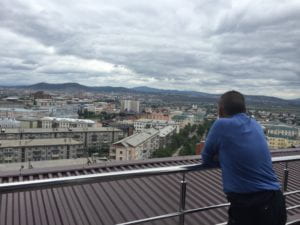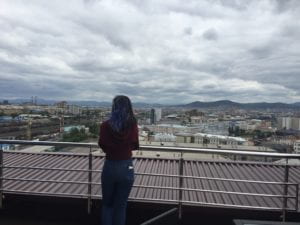Taran is around 60, and is an ethnic Buryat Mongol Russian. Although he grew up in a frontier town north of Lake Baikal, he’s worked in Moscow, northern China, Hong Kong, and now is trying to open a gem mine in Siberia. Taran is fluent in Russian, English, and Chinese—but not in Buryat, the language of his parents. Unlike Victor, who we met on accident, we paid Taran to drive us around and host us in Ulan-Ude. We never truly found out why Taran wanted to host people in his home.
Note: Taran is not our host’s real name. And all quotes come from our own memories.
On our journey east, every single Russian we met told us we had to stop at Lake Baikal. So even though we hadn’t planned on it, we asked Taran, our host in Ulan-Ude, if he could drive us the two and a half hours to Baikal.
Taran met us at 4:45am at the train station—a shortish man dressed in designer athletic wear and a baseball cap. He smiled, but his expression was guarded. I thought of how different he was from Alice, our Moscow host.
“Thank you for picking us up this early,” said Melody. I nodded, in no mood for talking, and Taran said something polite as we exited the train station. Unlike the Moscow train station, there were no security checkpoints “How can you afford to take the whole day off for us?” Melody asked.
“Oh, I don’t work,” said Taran. “I’m living with my parents for now.” I thought this was odd, given his high-quality running clothes, and started to classify him as a second-generation rich guy, sort of the Russian equivalent of the Chinese “fu er dai.”
“What’s with all these people not working?” whispered Melody enviously. “He’s only my dad’s age!”
We walked to his car, which turned out to be a shiny black four-wheel drive, only exacerbating my uncharitable (and hypocritical) impression of him as privileged. Taking our bags from us, Taran arranged our luggage in the trunk around his American mountain bike—which, he told us later, had been very expensive. Overall, I was very confused. Most of the people who volunteered to host via Couchsurfing or Homestay tended to be young and middle-class, excited to meet new people and exchange stories. None of them were well-off middle-aged men who didn’t seem to know what to do with us. I wanted to note this difference to Melody, but realized that since Taran spoke both English and Chinese, we couldn’t just switch languages to converse secretly, as we had been doing the whole trip. I felt hampered and irrationally irritated.
Melody and I settled into the backseat, and we took off for Lake Baikal. As he drove, the sun rose over the mountains and shimmered over the two rivers that pass through Ulan-Ude. I wanted to go back to sleep, but the mountain sunrise was too beautiful. We drove over a hill and down into a series of flatter plains, finally escaping Ulan-Ude’s urban sprawl. To my left, I saw the abandoned concrete remains of a building complex.
“Was that a factory?” I asked Taran, breaking the silence of the past half hour. Melody opened her eyes, having drifted into a shallow sleep.
“Yes, it was a milk factory,” he answered. “In the Soviet Union times, Ulan-Ude was famous for its milk and agriculture.” He paused. “Not anymore.” The quiet turned melancholy.
“All the good things about Soviet times have gone, and all the bad things have remained,” Taran remarked after a while. It reminded me of the quote from The Lord of the Rings when Samwise Gamgee wonders “Are all the sad things going to come untrue?” But the saying was all twisted; instead of all the bad things coming untrue, they perversely remained.
“What were the good things?” I asked tentatively.
“Industry standards were higher,” he explained. Milk, metal, crystal—all were of higher quality in the USSR. In Ulan-Ude, there were steel and plane manufacturing plants, as well as milk and meat factories. Soviet scholarship was better, too. “In the Soviet Union, history was a science,” said Taran, laughing bitterly. “Now, it isn’t.” We liberal arts students looked at each other awkwardly.
“Young people don’t know as much any more, due to globalization and Instagram-ization,” continued Taran as he drove, warming up now that he had found a discussion topic. “They don’t remember the history of the Soviet Union anymore. Shouldn’t they at least know the basics?” The car crested another hill, and we turned onto a flat highway.
“In the Soviet Union, everyone was friendlier,” mused Taran nostalgically as we sped along. The pine trees on either side of the road turned into a dark green blur. “You knew your neighbors. There was equality. Now, no.”
At the same time, Taran admitted that growing up in the USSR wasn’t all good. “There was an air of unfreedom that I could feel, even as a child,” he said about an hour into the drive. “As children, we had to attend propaganda classes, but I knew they were bullsh*t. Even the adults knew it was bull, but they still taught it. That’s gone now.”
“And what bad things remained?” I ventured.
“People are still complacent!” Taran said vehemently. “If there is a hole in the road, they still won’t complain to the government. It’s hard to start your own business, so no one does. And Russians still don’t like music or change.” That reminded me of Arsenii, the musician who we met on the train to Krasnoyarsk. He also complained that Russian music culture is terrible.
We stopped for breakfast, the first hot food Melody and I had eaten in days. I emptied my packet of Starbucks instant coffee into a mug of hot water and tried to wake myself up. But as always, Melody graciously saved me from having to make conversation.
“So what did you do before you retired?” she asked Taran between sips of soup.
“I’ve worked in Moscow and in northern China, where I learned Chinese. I even worked in Hong Kong for a few months, managing the new branch of a manufacturing company. But I hated it there; it’s too crowded. I missed the Siberian openness.” He smiled genuinely and gestured to the mountains outside. Taran continued on about roadtripping across China, studying Chinese at Hainan University, hopping from job to job. Even though he didn’t have a career, he had done pretty well for himself. Later Melody would describe him as an entrepreneur and an opportunist. It turned out my earlier assessment of him as the son of rich parents couldn’t have been more wrong; everything he had he had made for himself.
“I’m actually not retired,” he continued. “I’m trying to open up a mine north of Lake Baikal, involving some Chinese investors. If it goes as planned, we’ll extract gems and gold and create our own brand of jewelry, to sell abroad in Europe. So I’ll live in Ulan-Ude, but still get to travel. Right now, the Chinese investors are doing studies on some rock samples, and I’m waiting for them to get back to me.”
“That’s interesting,” said Melody cautiously. “You grew up north of Baikal, right?”
“Yes,” said Taran. “Practically in the wilderness; we were the first settlers there.” Melody frowned slightly, and I watched her try to reconcile Taran’s love for pristine Siberian nature and his plans to turn that same wilderness into a mine.
“But won’t your gem mine damage the surrounding environment?” she asked tentatively.
“No, because we aren’t going to dig deep; we are going to pan for gold,” he said.
“Is that a less disruptive way to extract the stone?” I asked. Taran didn’t really answer, but Melody confirmed that it was less disruptive.
Even so, it was an odd moment. While my first instinct was to disapprove—mines are bad—the larger part of me felt it wasn’t really my place to judge. Who am I, with my fancy traveler’s backpack, someone who flies across continents multiple times a year, to look down on him? He’s from Siberia. He’s mining Siberia. And it’s not really my business.
Neither Melody nor I mentioned the mine again.
For the rest of the trip with Taran, we danced awkwardly from friendly conversations to monetary transactions. Sometimes, he seemed genuinely amused by our antics—like when Melody and I insisted on swimming in Lake Baikal in 7oC, or when we posed by a “Your Dreams Will Come True” advertisement on the beach. But he also kept charging us for services we didn’t anticipate. He was an opportunist—what did we expect? After one exchange where he tried to charge us an exorbitant amount for transportation to a temple and then back to the train station, I left to pack my bags with a sour taste in my mouth. I was eager to get away, and I think Melody felt the same.
In walked his mother, an elderly woman who doesn’t speak any English. Her toes were practically turned under onto themselves, so she had to shuffle slowly to reach us. She gestured at Melody and then held out a red necklace with matching earrings, smiling and indicating to Melody to put it on. She did, murmuring thanks. For me she held out an amber-colored necklace and bracelet, which I had to adjust to fit my wrists.
“Are these for us?” Melody asked, the question not really aimed at anyone. Taran’s mother nodded, though I doubt she understood a word. Then she leaned in and embraced Melody, kissing her on the cheek, and did the same to me. Her soft, wrinkly skin reminded me of my own grandmother, and how she holds my face and kisses my cheeks every time I leave for Singapore.
May the Lord bless you and keep you, my grandmother always says. May he lift his countenance upon you and give you peace. I didn’t understand what Taran’s mother said in Russian, but I felt the message was the same. Her kindness washed away the resentment I had started to feel towards her son.
In the end, we ran out of money, and told Taran we’d just take a bus back to the train station. Slightly chastened, he instead walked back on his earlier fee and took us to a monastery and train station for free.
“I wonder why he volunteered to host us,” speculated Melody as we got on the train to Ulan-bator. “Did he want to make friends? To make money?”
I didn’t have an answer. But I think Taran didn’t know what he wanted, either. Maybe with all his moving around he was lonely. Certainly, if he had wanted to really rip us off, he could have been far more unscrupulous. With his mother’s kind gifts still hanging around my neck, I left Ulan-Ude feeling strangely sad. Perhaps I’ve been too harsh on our host. Perhaps I’m just spoiled after receiving copious generosity from others.
But Taran’s melancholy statement stuck with me as we left Russia and moved into Mongolia, the phrase feeling dark and almost prophetic.
All the good things about Soviet times have gone, and all the bad things have remained.

